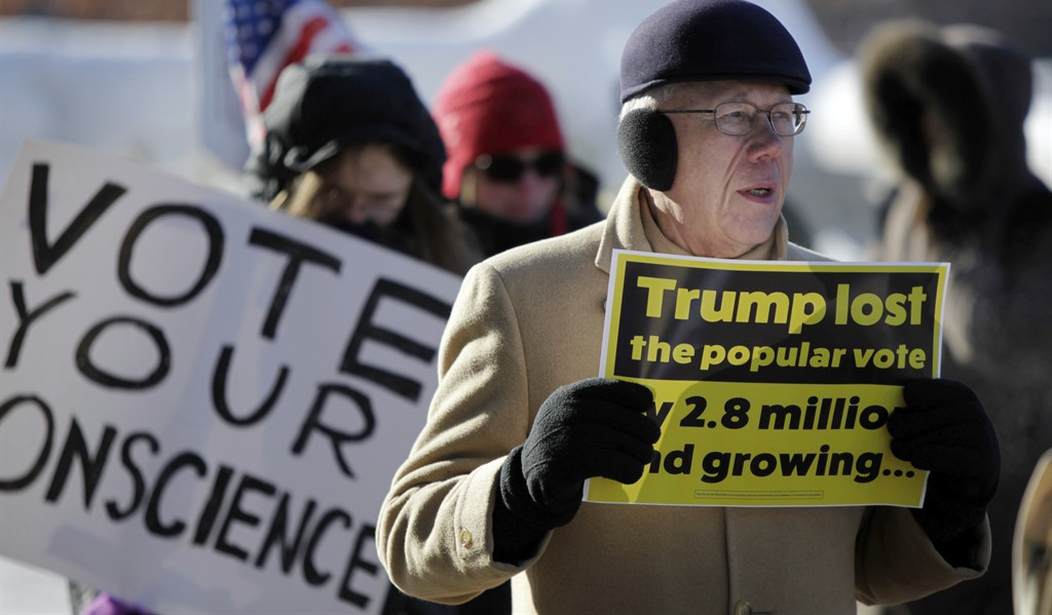It’s only happened five times in our history. The winner of the presidential race wins the Electoral College but loses the popular vote. The elections of 1824, 1876, 1888, 2000, and 2016 saw a president be elected in this manner. And yet, we’ve survived. Also, this has only happened five times. It’s rare, but 2016 was different because of Trump. Democrats were lusting for Hillary Clinton to win. The media were hoping she would win, but she didn’t. She lost. She’s a two-time loser. She will never be president. Still, liberals were seething over the results. They still are. So, what do they do? Well, they start the ‘abolish the Electoral College’ mantra. The system in which we’ve picked our president was attacked as undemocratic and racist. Cue the eye rolls. In Colorado, they’re getting the ball rolling by trying to pass legislation that ties the state’s electoral votes to whoever wins the popular vote (via Denver Post):
A Colorado bill that could help change how the country elects the president is heading to its final vote after passing out of a House committee on a party-line vote Tuesday night.
The bill would add Colorado to an agreement between a growing number of states to award their Electoral College votes to whomever wins the national popular vote for president. It passed the Senate in January without a single Republican voting for it, and now heads to the House where Democrats hold a substantial majority.
The debate over the bill went well into the night Tuesday, and much of it centered around whether it’s constitutional for states to band together and fundamentally alter presidential elections. And while only a few the more than 80 people who testified mentioned President Donald Trump mentioned by name, the results of 2016 election (where Trump lost the popular vote) worked their way into the testimonies of people on both sides of the issue.
Jenna Ellis, a constitutional law attorney who works for Colorado Family Action, gave the committee three reasons why she thinks the bill is unconstitutional.
The first was that it would violate a part of the U.S. Constitution called the compact clause, which says states can’t enter into agreements with each other without federal approval. Second, the bill would remake the Electoral College without a constitutional amendment. And third, it could impact the part of the 12th Amendment that gives Congress the power to decide the presidency if no candidate gets the 270 votes required to win the Electoral College.
[…]
Rep. Jeni Arndt, D-Fort Collins, disagreed with Ellis about whether her bill violates the compact clause. She pointed to several Supreme Court decisions where the court let states enter into certain agreements. She also said the U.S. Constitution gives states plenary or absolute power to decide how they award their electors.
Recommended
I still don’t know where I fall on this issue. So far, our system works. On the other hand, an argument for this interstate compact is that it could nix bad social policy that’s tailored made for only battleground states. No Child Left Behind was crafted to win over Volvo-driving soccer moms in Ohio, a state the GOP (and the Bush team) needed to win; NCLB has had mixed results to say the least and it accelerated the federalization of education. Again, not endorsing this shift, though when I attended a seminar on this interstate compact, one thing that was appealing is that both sides can run the campaigns that they want. Republicans can run on freedom, economic liberty, and smaller government and liberals can run on the Green New Deal hardcore. I think we would win handily. For now, however, I’m not one to rock the boat. The Electoral College has served us well. It continues to do so. And with the Democratic Party undergoing a whacko left-wing swing that will scare away moderates and independents, I think there will be more ways to skin the electoral cat, as the saying goes.

























Join the conversation as a VIP Member